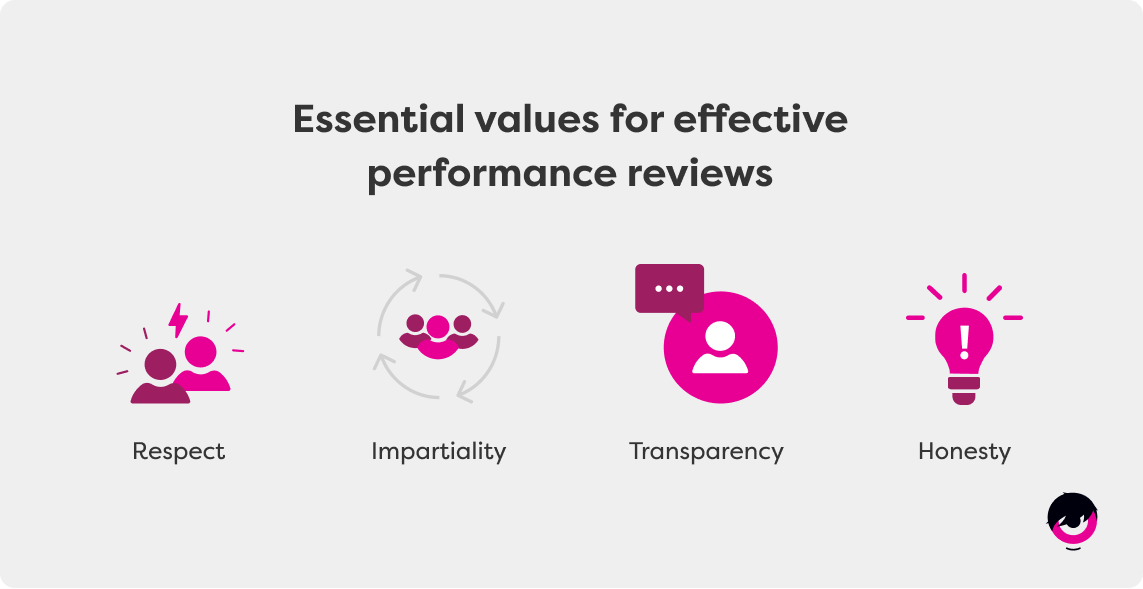Before we start with the preparation steps, you might be questioning the need for upfront planning before conducting employee performance reviews.
Simply put, a bit of preparation beforehand means better organization and communication, which implies less risks of misunderstandings and evaluation failures. Having a clear action plan ahead of time maximizes your chances of effective performance management practices, with crucial benefits for everyone involved.
Now that we got this short explanation out of the way, it’s time to prepare for your performance evaluations! Don’t forget to get your free employee performance evaluation template before you start.
1) Choose Your Preferred Method and Frequency
The first step might seem obvious but is surprisingly often overlooked: many types of performance evaluations exist, and you have to choose the most appropriate for your context.
Here is a short recap of performance review methods:
- Standard or traditional performance reviews: All employees will be evaluated according to predetermined criteria such as motivation or teamwork. These evaluations are easy to set up and fit practically every context but might lack individual interest for the employee.
- 180-degree feedback evaluation: This method includes a self-evaluation from the employee, meaning they need to question their work methods and highlight their successes. However, this assessment requires a good mindset to support individual development.
- 360-degree performance review: Is similar to the 180 evaluation but includes peer feedback or 360-degree feedback for a global perspective of performance. Sharing different views is interesting but might lead to issues of neutrality.
- 3.0 Evaluation: A more flexible approach to performance evaluation, with regular meetings and a better vision of performance throughout the year. Both the employee and the manager are evaluated on specific goals. However, this type of performance review is only realistic for some and might be challenging to organize in particular settings.
- 9-box Grid: Helps to distinguish between performance and potential by placing the employee in a specific performer category. This method highlights growth potential but being categorized as a low performer might be a source of stress and discouragement.
In addition to choosing the type of evaluation you need to conduct, you will need to set up the frequency that suits you best. Whether they are conducted annually, quarterly or monthly, performance reviews can be effective and instructive as long as they fit your reality.
Choose wisely depending on your needs and context and stick to the guidelines for the evaluation method you picked, and you will ensure a comprehensive performance evaluation experience for your employees.
2) Collect Data and Take Notes
Now that you have chosen your evaluation method, it is time to gather data before D-day! Taking notes is essential even before you have scheduled the performance evaluation slots.
Employee performance data can be collected throughout the year during informal catch-ups or formal meetings, which can support your performance improvement plan and your continuous feedback culture.
A list of goals can also be set up for further information on the employee’s productivity and career growth. We recommend that you define realistic goals, such as SMART goals that support strategic objectives.
Other vital means to collect performance data are Key Performance Indicators (KPIs) that help visualize employee performance throughout the year while detecting potential drops in productivity.
In any case, don’t come to the interview empty-handed. You need to use unbiased data and clear criteria to build your evaluation plan and start setting up your schedule and communication.
Did you know that Folks HR offers complete performance management features and all the KPIs you need to measure employee performance? Request your free demo today!
3) Schedule and Communicate
Employees should know that performance reviews are coming way before the actual date. Scheduling in advance lets them time to get ready for the meeting and take their own notes beforehand. Make sure your schedule is empty or flexible around the assessment time slot, as some performance meetings might take more time and should not be rushed.
As with every aspect of HR, communication is key. Don’t forget to send a reminder to your employees two days before the evaluation so that they clear up their own schedules if needed.
4) Write Down Constructive Feedback and Words of Recognition
Now that everyone is in the loop, it is time to look at the data and notes you have previously collected to draw intel and actionable feedback you will use during the performance review conversation.
If you notice any recurring issue or barriers to success, highlight them and consider opportunities for improvement. On the other hand, remember to mention any progress or achievements the employee has made throughout the year. Constructive feedback and employee recognition messages are your best allies for an effective performance review process.
Feel free to read our article for examples of constructive feedback to share with your employees.
5) Rehearse Your Tone and Stance
Have you written down your short list of comments and feedback? Great, now that you have determined what you will talk about, it is time to think about how you want to talk about it.
The goal here is not to prepare a full-blown speech but to ensure your tone is not confrontational, cold, or accusatory. So quickly recap what you will say in broad terms and step in the employee’s shoes for a few minutes: how would you perceive these words if you were on the other side of the table?
If your discourse seems fair and constructive, you’re good to go. However, if your words could offend or stress out your employee, you might want to make a few adjustments.
Thoughtful preparation is key, but remember to be authentic:
Overpreparation of feedback can leave your delivery feeling robotic or forced, which makes tough feedback even harder to swallow. Go in with a plan of what you want to discuss, but exercise plenty of empathy and don’t be afraid to change course.
For example, an employee might not be meeting company standards. That’s a difficult pill to swallow — especially if they’re faced with corrective or disciplinary action. If they take the news poorly and need time to digest, don’t overwhelm them with a laundry list of other negative comments.
Instead, talk it over. Ask them how they feel about it, give them space to think, and let them ask questions. Make sure that they fully understand everything you tell them and have a plan moving forward before moving onto your next point or critique. By extending feedback in a collaborative and supportive environment, employees will receive criticism much more positively. They’ll take the necessary steps to improve without any further action needed. – Andrew Gonzales, Co-Founder and President at BusinessLoans.com
Need help determining which performance review phrases you should use? We have 50 concrete examples – and a free template – to help you out!
6) Commit to essential values
Although it can be helpful to choose your words in advance, the interview needs to flow naturally and feel like a two-way conversation. Performance appraisals are not meant to be a moment where managers read off a bullet-point list in a monotone voice. Even though preparation is essential, you will never know what to expect, and you need to be flexible and ready to listen to your employee.
That is why, through every step of your preparation for employee performance evaluations, we recommend that you commit to the 4 golden rules of any effective performance review: Respect, Impartiality, Transparency and Honesty.
- Respect: Remember that you are evaluating the performance of a human being, not of a machine. Be respectful of their feelings, choose your words carefully, and always try to look for solutions. Most importantly, listen to what the employee has to say, and don’t forget to highlight their accomplishments.
- Impartiality: Your evaluation can’t focus on the employee’s character (unless their behavior is problematic) or on personal matters. Performance should be evaluated through clear, pre-established criteria and you have to remove all bias from your review.
- Transparency: Be transparent about how you evaluated performance (indicators, factors, criteria) and mention any productivity issue you might have noticed. Remember to be receptive to your employee’s responses and complaints, and work to find solutions together.
- Honesty: Positive feedback and employee recognition are important. So is honesty! If something needs to be said, say it. Performance reviews are the perfect opportunity to lay all cards on the table for both parties. Don’t be scared of having an elaborate discussion, as long as it’s a respectful and productive conversation.
There you go: with these golden rules in mind and all our previous tips, you’re more than ready to tackle your employee performance reviews swiftly and efficiently.

Discover the ultimate guide to preparing for employee performance reviews:
Get everything you need in one place with our free performance review ebook!

